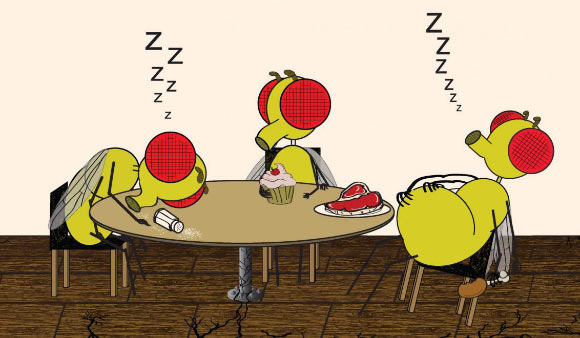Higher protein and salt content in our food, as well as the volume consumed, can lead to longer naps, a new study in fruit flies suggests.

According to Murphy et al, large, salty, or protein-rich meals induce post-meal sleep in fruit flies. Image credit: Keith Murphy.
Many of us have experienced feelings of sleepiness after a large meal. However, there is little scientific evidence that this ‘food coma’ effect is real.
If it is, it may vary between individuals, or depend on the type of food consumed. This variability makes it difficult to study the causes of post-meal sleepiness.
“Different foods play different roles in mammalian physiology, but there have been very few studies on the immediate effects of eating on sleep,” said Dr. William Ja, corresponding author on the study and a researcher in the Department of Neuroscience and the Department of Metabolism and Aging at the Scripps Research Institute.
Dr. Ja and co-authors used the common fruit fly (Drosophila melanogaster) as a model, due to the well-documented sleep-metabolism interaction in which flies suppress sleep or increase locomotion when starved.
“In Drosophila, there is a well-documented interaction between sleep and metabolism, whereby flies suppress sleep or increase their activity when starved,” Dr. Ja said.
“However, the acute effects of food consumption on sleep have not yet been tested, largely because there was no system available to do so.”
To better understand this relationship, the team created a system called the Activity Recording CAFE (ARC), a small plastic chamber that allowed them to record fly activity before and after feeding.
Recordings of fruit flies’ behavior from this system reveal that, after eating a meal, the flies sleep more before returning to a normal state of wakefulness.
The sleep period generally lasts 20-40 min, with flies that eat larger portions generally sleeping more.
To determine if individual nutrients could modulate post-meal sleep, the authors gave the flies food consisting of protein, salt or sugar.
They found that only protein and salt were effectors of post-meal sleep, suggesting that this form of sleep can indeed be regulated by specific food types.
“The protein link to post-meal sleep has been mostly anecdotal, too, so to have it turn up in the study was remarkable,” Dr. Ja said.
“In humans, high sugar consumption provides a quick boost to blood glucose followed by a crash, so its effect on sleep might only be observed beyond the 20 to 40 minute ‘food coma’ window.”
“We next sought to identify a neuronal mechanism by which feeding drives post-meal sleep,” added study first author Keith Murphy, a graduate student at the Scripps Research Institute.
“By using genetic tools to turn neurons on and off in the fly brain, we were surprised to find a number of circuits that play a role in controlling this behavior.”
A previous study has shown that leucokinin (Lk) neurons are involved in meal-size regulation, indicating that this system acts rapidly during feeding to signal a behavioral shift.
Building on this work, the researchers demonstrate that the Lk system plays a role in post-meal sleep.
“A subset of leucokinin receptor (Lkr) neurons was necessary to initiate post-meal sleep in the presence of protein specifically,” Murphy said.
“While we expected that flies defective in protein sensing would experience post-meal sleep in a similar way to those fed only sucrose, we found instead that they had a waking response.”
“Our analysis suggests that ingested protein promotes both sleep and wakefulness, and that the wakefulness is counterbalanced by Lkr neuronal activity.”
The scientists also found that other brain circuits are sensitive to the fruit fly’s internal clock, reducing post-meal sleepiness only around dusk.
Taking these results together, the authors conclude that post-meal sleepiness can be regulated in a number of different ways in flies and humans alike.
The study was published in the journal eLife on Nov. 22, 2016.
_____
Keith R. Murphy et al. 2016. Postprandial sleep mechanics in Drosophila. eLife 5: e19334; doi: 10.7554/eLife.19334







